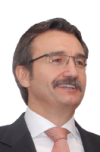
Turkey’s ruling Justice and Development Party (AKP) has worked continually since its accession in 2002 to present the country as a modern free market economy as it strives to secure EU membership. The country’s leadership has overseen a transformative period of government in which rapid economic development has co-existed with a struggle between those who see a secular future for Turkey and those proposing an Islamic state.
State minister for foreign trade Kürsad Tüzmen feels he has played a significant role in Turkey’s development from an agrarian economy to a major international exporter of high value goods. “For the past five years, I have been the OECD [Organisation for Economic Co-operation and Development] world record holder for exports,” he says of the unbroken 35% export growth rate. But even the ebullient Mr Tüzmen recognises that the slowdown in global trade flows may affect this performance. He says: “Now, I can still keep the gold medal but I won’t be able to break my own record.”
Advertisement
Long-term optimism
Yet, this former national swimming champion remains optimistic in the long term, as Mr Tüzmen believes his achievements will stand the economy in good stead, despite current financial challenges. “For 20 years, I dealt with export items at $2000 a ton, which is good but not good enough to carry Turkey into the future,” he says, citing a milestone three years ago when Turkey started manufacturing cockpit simulators bound for South Korea at $2m a ton.
As an undersecretary of foreign trade and a minister of foreign trade for more than 10 years, Mr Tüzmen says that he has shifted Turkey’s basic selling points. “I tried to encourage industries such as automotive, shipbuilding, software, electronics, ceramics, steel and iron,” he says.
Automotive success
Modern Turkey has enjoyed considerable success from its automotive manufacturing sector, which has attracted investment from most of the multinational carmakers. Although the country’s automotive industry success will suffer as a result of the global downturn, Mr Tüzmen says the scale of the industry in Turkey is such that it will survive. “We need to encourage domestic demand a little during this crisis but I think the industry will support this crisis,” he says.
Alongside the likelihood of a dwindling automotive sector, Turkey is trying hard to establish a reputation for aerospace manufacturing, particularly within the Aegean Free Zone located in Izmir, which Mr Tüzmen sees as a complementary rather than substitute business activity.
Improved infrastructure
Although the basic infrastructure for the development of an aerospace industry in Turkey was not good enough in the past, says Mr Tüzmen, it is much improved. But if the sector is to become successful, it must overcome skills and financing challenges.
“The government support sources do not have enough funds for the skills needed for the aerospace industry but we are now starting to be able to manufacture and develop some new technology elements in our exports,” says Mr Tüzmen.
Advertisement
And besides, says the minister, Turkey’s foreign trade and other macroeconomic indicators for 2002 are equal to that of 2007 in Spain, so if Spain has an aerospace industry, then so can Turkey.
CURRICULUM VITAE
Kürşad Tüzmen
2002Government of Turkey
State minister for foreign trade
1999Government of Turkey
Undersecretary of foreign trade
1997Government of Turkey
Deputy undersecretary of foreign trade